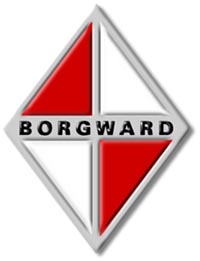


The announcement on 18 September that Ford intend to exercise their option to purchase the Rover trademark from BMW caused scarcely a ripple of excitement even in the automotive press, but the Blue Oval's move prompts some speculation on the future relationship between the established carmakers and the increasingly sophisticated and highly ambitious motor industry in China.
As several Chinese manufacturers such as Great Wall, Geely Automobile, Chery, and Lifeng ready themselves to enter sophisticated western markets with indigenously developed products, a number of names of 'companies which used to make cars' could become very valuable commodities.
Just look round the electrical department of your local hyper-market and you will find numerous resurrected brand-names on generic products from the People's Republic. I don't doubt that most consumers approach the purchase of a car with more thought than buying a kettle or DVD player, but adoption of an established name, even one carrying negative historical baggage, could give an unknown manufacturer a five to ten year advantage in brand recognition in a new market.
Nanjing Automobile Group's purchase of the physical and invisible assets of MG Rover looks shrewder by the day. Even if Nanjing themselves have no use for the Austin, Morris and Wolseley trademarks, they could soon be saleable for far more than was paid for MG Rover's assets.
Such thoughts also bring to mind other dormant nameplates which have the potential to be resurrected:
- The various Rootes brands now held by PSA, along with Simca and Panhard
- Riley and Triumph, now owned by BMW, probably never to be used
- The others, held by Fiat, VW, BMW and possibly nobody - Autobianchi, Borgward, Daf and DKW
Volkswagen Group are unhappily saddled with one unused trademark which the Anglophone now more commonly associates with a genito-urinary disorder, but Simca and Sunbeam could have international potential, and was there ever a trademark given up so carelessly as Triumph?
Rover's Viking longship is unlikely to appear on a Ford product any time soon, although the move does support Ford's reassurances that Land Rover has a future within Premier Automotive Group. The greater significance is that they are willing to outflank SAIC to put the Rover trademark 'beyond use' by potential Land Rover competitors. Let us not forget that thwarted bidder SAIC's portfolio includes a majority shareholding in the ambitious 4x4 specialist Ssangyong.
It may be no more than a straw in the wind, but Ford's purchase is a clear indicator that the established carmaking groups recognise the potential threat of an increasingly autonomous and competitive Chinese industry, and will guard these trademarks as fiercely as they have done the intellectual property rights for their licensed products. If they do not, they could find themselves staring down the barrels of the guns they have just sold.
No comments:
Post a Comment